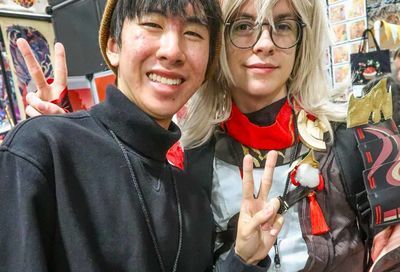U.S. Appeals Court issues orders, consolidates challenges to Virginia’s marriage ban
 The U.S. Appeals Court for the Fourth Circuit on Monday issued three orders relating to two pending cases challenging Virginia’s ban on same-sex marriage.
The U.S. Appeals Court for the Fourth Circuit on Monday issued three orders relating to two pending cases challenging Virginia’s ban on same-sex marriage.
The first case, Bostic v. Rainey, was heard in February by U.S. District Court judge for the Eastern District of Virginia, Arenda L. Wright Allen, who found that Virginia’s constitutional amendment – known as the Marshall-Newman Amendment – defining marriage as solely between a man and a woman and prohibiting any legal recognition of same-sex relationships, is unconstitutional. Allen then issued a stay on her order, meaning that same-sex marriages may not be performed in the commonwealth until the Fourth Circuit rules on whether to uphold or overturn her decision following an appeal by opponents of marriage equality.
The court agreed to an expedited schedule that Attorney General Mark Herring (D) had proposed in a motion agreed to by all parties. As a result, the opening brief from appellants, those seeking to uphold the ban, will be due March 28, with a response brief from the pro-marriage-equality side due April 11, and a reply brief from opponents of same-sex marriage due April 30.
The court also approved the state’s request to file a separate brief in the case, since Virginia’s position on whether the ban is constitutional is different from other appellants’ positions, a change that was announced by Herring at a January press conference. As a result, Virginia will file its brief on or before April 11, the same time as the appellees seeking to have Judge Allen’s decision upheld.
The Fourth Circuit court also tentatively scheduled oral arguments to be heard May 12 to 15.
Lastly, the court gave permission to the plaintiffs in Harris v. Rainey (formerly Harris v. McDonnell), Virginia’s second case challenging the existing ban on same-sex marriage that is currently pending in U.S. District Court for the Western District of Virginia, to intervene in the Bostic case. As a result, the lawyers representing the Harris plaintiffs will be permitted to file their own brief at the same time as the Bostic appellees, allowing the court to hear arguments from all parties seeking to uphold Allen’s ruling overturning the ban.
The Harris case was previously granted class action status on Jan. 31, meaning that any Virginia unmarried same-sex couple or one whose out-of-state legal marriage is not recognized may join the case. The case is still awaiting a decision from the U.S. District Court, but whatever the outcome, once the case is appealed it will be referred to the Fourth Circuit.
The last move, combining the two cases, comes after lawyers for the Bostic plaintiffs, including Ted Olson and David Boies, assisted by the American Foundation for Equal Rights (AFER), objected to an intervention by counsel in the Harris case, led by the American Civil Liberties Union (ACLU), the ACLU of Virginia, Lambda Legal and law firm Jenner and Block.
Nonetheless, AFER issued a press release following the Fourth Circuit’s orders, celebrating the court’s acceptance of the expedited schedule and welcoming the intervenors to the case.
“AFER is thrilled that the Fourth Circuit has granted its request to expedite the hearing schedule in our plaintiffs’ marriage equality case,” AFER Executive Director Adam Umhoefer said in the statement. “The Fourth Circuit clearly recognizes the importance of the Bostic case to thousands of gay and lesbian Virginians and their families, and AFER looks forward to presenting our arguments before the court in May. We welcome the Harris case as intervenors in support of our plaintiffs’ case.”
The ACLU, ACLU of Virginia and Lambda Legal also issued a joint press release celebrating the court’s decision.
“We’re thrilled that all of Virginia’s same-sex couples will be before the court of appeals together, arguing for the freedom to marry and bringing their many compelling stories to the common cause,” Joshua Block, a staff attorney with the ACLU Lesbian Gay Bisexual and Transgender Project, said in the statement.
“We are pleased the court granted our motion to intervene because the Bostic appeal could decide the fate of not only both couples involved, but also the entire class of more than 14,000 same-sex couples in Virginia whom we represent,” said Greg Nevins, the counsel in Lambda Legal’s Southern Regional Office. “We are still waiting for a decision in the Harris case, but allowing the Harris class to intervene in the Bostic case allows the two cases to be consolidated on appeal without delaying or disrupting either case. We want the freedom to marry to come to lesbians and gay men in Virginia as swiftly as possible.”
Accelerated Schedule Court Order
Court Order Granting Intervention
[Photo: Bostic v. Rainey plaintiffs Carol Schall and Mary Townley. Credit: Glenn Fajota/American Foundation for Equal Rights.]
Support Metro Weekly’s Journalism
These are challenging times for news organizations. And yet it’s crucial we stay active and provide vital resources and information to both our local readers and the world. So won’t you please take a moment and consider supporting Metro Weekly with a membership? For as little as $5 a month, you can help ensure Metro Weekly magazine and MetroWeekly.com remain free, viable resources as we provide the best, most diverse, culturally-resonant LGBTQ coverage in both the D.C. region and around the world. Memberships come with exclusive perks and discounts, your own personal digital delivery of each week’s magazine (and an archive), access to our Member's Lounge when it launches this fall, and exclusive members-only items like Metro Weekly Membership Mugs and Tote Bags! Check out all our membership levels here and please join us today!

















